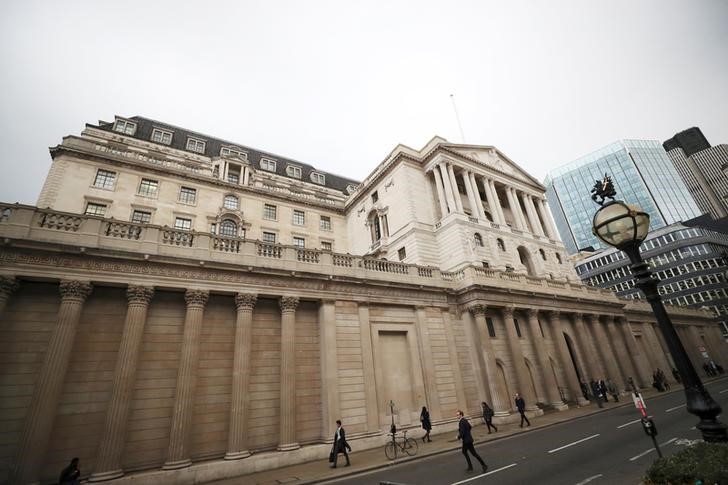 © Reuters. People walk past the Bank of England in London
© Reuters. People walk past the Bank of England in LondonBy David Milliken and Andy Bruce
LONDON (Reuters) – Bank of England rate-setters spelled out their differences on Tuesday over the central bank’s first interest rate hike in a decade, as they focused on how to determine when low unemployment was about to push up inflation.
Four of the Monetary Policy Committee’s nine members spoke to lawmakers, nearly three weeks after the committee voted 7-2 to raise the main rate to 0.50 percent from 0.25 percent.
Many economists outside the BoE thought the decision was premature given Britain’s still-weak pay growth and uncertainties about Brexit which are weighing on the economy, despite robust global growth which has led the United States and the euro zone to start to tighten monetary policy.
Gertjan Vlieghe, an external MPC member, said he switched his vote to support the rate hike due to signs that employers were finding it harder to recruit staff and that employees were more confident about changing jobs for higher pay.
He also said measures of underemployment were falling.
“It is early days, but I do think there is some evidence that this process … has now begun,” Vlieghe said told a parliamentary committee that monitors the BoE. “If you wait until all the signs are lined up to support the decision then you will almost always be too late.”
Another MPC member who voted for the rate hike, Michael Saunders, said he thought the unemployment rate could fall only a little bit further before it started to push up inflation.
“I consider it quite possible that the equilibrium jobless rate is slightly below our 4.5 percent estimate, but probably only slightly,” Saunders said.
Jon Cunliffe, a BoE deputy governor who was one of the two MPC members who voted against a rate hike, said he shared the “overall framework” of the MPC’s views on the economy.
But he pointed to low domestic inflation pressures, the absence of signs that the weak pound was feeding through into wage growth – so-called second round effects – and inflation expectations around their historical averages.
“(These) make it possible to wait before tightening policy until there is clear evidence that pay growth is responding to the level of unemployment in line with our forecast,” Cunliffe said.
The officials also said investment growth was weaker than they would have hoped, given the strong global economy, advanced stage of the business cycle and cheap cost of credit.
This probably reflected Brexit uncertainties, as well as businesses’ failure to lower the minimum return they expected from projects despite the sharp fall in financing costs compared with before the financial crisis, they said.
Vlieghe and Cunliffe said the central bank was not going to jump to any conclusions about Brexit – even if talks proved slow – and would stick with their assumption of a smooth departure in 2019 unless business and consumer surveys suggested otherwise.
Saunders added that rapid growth in unsecured consumer borrowing and personal insolvencies was “a little bit of a concern” but said another arm of the BoE was taking steps to avoid a repeat of the conditions before the 2008 crisis.
Fusion Media or anyone involved with Fusion Media will not accept any liability for loss or damage as a result of reliance on the information including data, quotes, charts and buy/sell signals contained within this website. Please be fully informed regarding the risks and costs associated with trading the financial markets, it is one of the riskiest investment forms possible.
Source: Investing.com





























